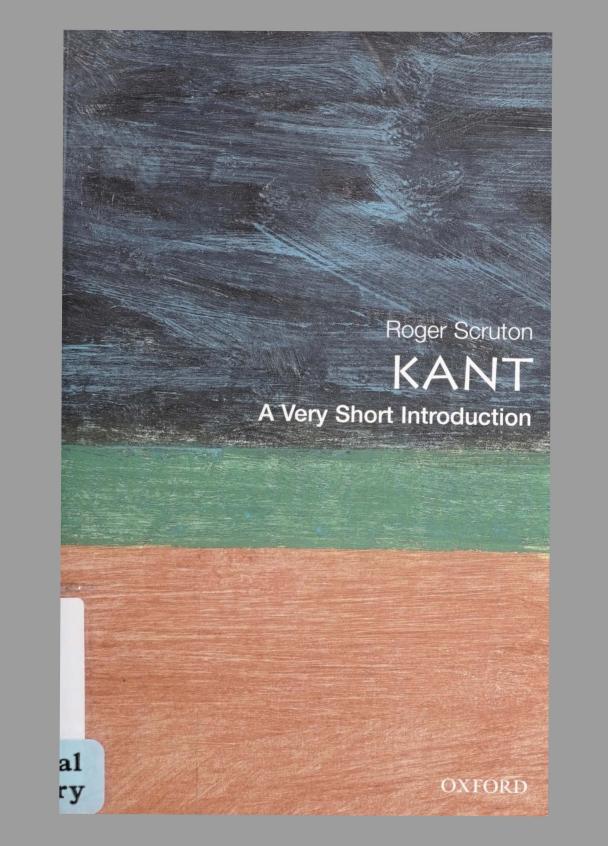Kant: A Very Short Introduction by Roger Scruton

Author:Roger Scruton [Scruton, Roger]
Language: eng
Format: azw3, epub, pdf
Tags: Philosophy, Political, Nonfiction
ISBN: 9780192801999
Publisher: OUP Oxford
Published: 1983-01-01T00:00:00+00:00
The soul
Kantâs discussion of the soul, and of the concept of the âselfâ from which it gains its initial description, is among the most subtle parts of his philosophy. The account is given in two complex arguments: the first at the beginning of the Dialectic, in which he attacks the rationalist doctrines of the soul; the second in the third antinomy, and in the Critique of Practical Reason, in which he describes the nature of morality.
The âParalogisms of Pure Reasonâ, which deal with the rationalist doctrines of the soul, were substantially revised for the second edition, perhaps because this aspect of the critical philosophy forms part of the multifaceted argument of the transcendental deduction, with which Kant had remained so dissatisfied. Kantâs argument in the Analytic had begun by recognizing the peculiar reality of self-consciousness. I have a privileged awareness of my states of mind, and this is an âoriginalâ or âtranscendentalâ act of understanding. The rationalists had sought to deduce from this privileged knowledge a specific theory of its object. They had thought that, because of the immediacy of self-awareness, the self must be a genuine object of consciousness. In the act of self-awareness I am presented with the âIâ that is aware. I can maintain this self-awareness even while doubting every other thing. Moreover, I am necessarily aware of my unity. Finally, I have an intuitive sense of my continuity through time: this cannot be derived from the observation of my body, or from any other external source. It therefore seems natural to conclude that I know myself to be substantial, indivisible, enduring, perhaps even immortal, on the basis of self-awareness alone. Such, Kant thought, was Descartesâs argument. Nor is the conclusion an eccentricity of the âCartesianâ view of consciousness. Like all the illusions of reason, it is one into which we are tempted just as soon as we begin to reflect on the datum before us. Every rational being must be tempted to think that the peculiar immediacy and inviolability of self-awareness guarantee its content. In the midst of every doubt, I may yet know this thing that is me, and, reason assures me, this intimate acquaintance with my own nature gives grounds for the belief in the immateriality of the soul. Furthermore, I cannot conceive of my own non-existence, since every attempt to do so postulates the âIâ as conceiver.
The reasoning is erroneous, since it moves from the purely formal unity of apperception to the substantial unity affirmed in the doctrine of the soul. âThe unity of consciousness which underlies the categories is ⦠mistaken for an intuition of the subject as object, and the category of substance is then applied to itâ (B. 421). Although the transcendental unity of apperception assures me that there is a unity in my present consciousness, it tells me nothing else about the kind of thing that bears it. It does not tell me that I am a substance (that is, an independently existing object) as opposed to an âaccidentâ or property.
Download
Kant: A Very Short Introduction by Roger Scruton.epub
Kant: A Very Short Introduction by Roger Scruton.pdf
This site does not store any files on its server. We only index and link to content provided by other sites. Please contact the content providers to delete copyright contents if any and email us, we'll remove relevant links or contents immediately.
Machine Learning at Scale with H2O by Gregory Keys | David Whiting(4289)
Never by Ken Follett(3930)
Harry Potter and the Goblet Of Fire by J.K. Rowling(3841)
Unfinished: A Memoir by Priyanka Chopra Jonas(3370)
Fairy Tale by Stephen King(3365)
The Man Who Died Twice by Richard Osman(3060)
Will by Will Smith(2901)
Rationality by Steven Pinker(2348)
It Starts With Us (It Ends with Us #2) by Colleen Hoover(2327)
Can't Hurt Me: Master Your Mind and Defy the Odds - Clean Edition by David Goggins(2319)
The Dark Hours by Michael Connelly(2299)
The Storyteller by Dave Grohl(2222)
Friends, Lovers, and the Big Terrible Thing by Matthew Perry(2211)
The Dawn of Everything: A New History of Humanity by David Graeber & David Wengrow(2185)
The Becoming by Nora Roberts(2183)
The Stranger in the Lifeboat by Mitch Albom(2110)
Cloud Cuckoo Land by Anthony Doerr(2087)
Love on the Brain by Ali Hazelwood(2053)
Einstein: His Life and Universe by Walter Isaacson(2003)
